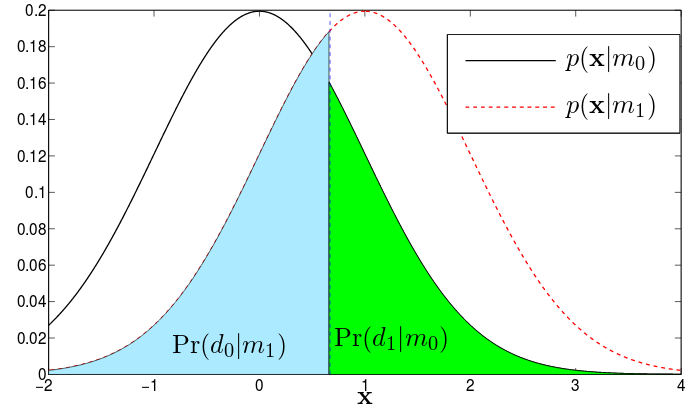Processing of statistical signals
Please note that the documents for the event are primarily made available via Panda. In case of doubt, the Panda documents are more up-to-date than the documents you can retrieve from this website.
Brief description

In the course Processing Statistical Signals, students gain an understanding of the importance of descriptive and inferential statistics for many fields of Electrical Engineering. They consolidate their basic knowledge of probability theory and statistics and gain an insight into estimation and detection theory as well as statistical time series analysis. In addition, methods are presented that can be used to evaluate estimated values obtained from data with regard to statistical significance. Knowledge of detection and estimation theory and time series analysis, as well as the critical evaluation of experimental results, are essential for the understanding and critical application of modern signal processing methods.
Lecture contents
- Random experiment, axiomatic concept of probability
- Concept of random variables, distribution function, important distributions of discrete and continuous random variables, random variable transformations
- Maximum likelihood parameter estimation, linear estimators, Cramer-Rao bounds
- Bayesian estimation methods
- Stochastic processes, stationarity, ergodicity, correlation function and power density spectrum, white noise, Markov chains
- Wiener filter, autoregressive processes
- Maximum-a-Posteriori and Neyman-Pearson decision rule, receiver operating characteristic, statistical hypothesis tests
Learning outcomes & professional competences
After completing this course, students will be able to
- describe random variables or signals using statistical signal processing methods
- independently carry out calculations regarding reliability, hit frequency etc.
- independently design and apply estimation methods for simple parameter estimation problems
- construct statistical hypothesis tests and apply them to specific problems
- define the boundary conditions for experimental investigations in such a way that the results lead to reliable statements
- compare newly acquired experimental data with existing models
- apply a correlation and spectral analysis to time series
- design optimal filters for given questions.
The students
- are able to apply the methods for describing quantities and signals as random variables or random processes to a wide range of problems in the field of electrical engineering and information technology.
- are able to assess the performance and limitations of statistical methods in various applications
- are able to critically evaluate the results of experimental investigations from a wide range of application fields and design experiments in such a way that their results allow reliable statements to be made
- can evaluate measurement results using modern programme systems
- can analyse more extensive tasks together in a group, break them down into subtasks and work on them in a solution-oriented manner.
Methodical realisation
- Lectures with predominantly blackboard use, occasional slide presentations
- Classroom exercises with exercise sheets and demonstrations on the computer
- Practical exercises with Matlab, in which students independently develop and implement an experimental setup and apply statistical analysis methods to the results obtained.
Recommended literature
- N. Henze, Stochastics for beginners, Vieweg-Teubner, 2010
- A. Papoulis, Probability, Random Variables and Stochastic Processes, McGrawHill, 1984
- S.M. Kay, Fundamentals of Statistical Signal Processing - Estimation Theory, Prentice-Hall, 1993
Classification
- Course for Master students
- ECTS: 6
- Language: German
- Semester: Winter term
Please note
- Target group: Master's students of Electrical Engineering and related disciplines
- Prerequisite/recommendation is a completed Bachelor's degree in Electrical Engineering or related disciplines. Basic knowledge of probability theory and statistics.
Bonus tasks
n the course of the semester, 3 bonus tasks are offered, with which you can collect points that can be credited for the subsequent VSS exam or possible oral exam. A maximum of 75 points can be achieved.
The processing time for a bonus task is 2 weeks from its publication. If necessary, a small programme (in Python) must be written for individual task points. The submission is immediately before the lecture on the given deadline.
Crediting of bonus points:
- In the case of a written examination, the bonus points only count if the examination has been passed. In this case, the bonus points collected should be divided by 10, rounded and added to the points achieved in the examination. A grade jump in an exam usually costs 5-6 exam points. This means that you can use bonus points to improve your exam grade by up to two grade levels (e.g. from 2.3 to 1.7).
- In an oral examination, there is a fixed mapping of the bonus points collected to the examination grade: 0-37 bonus points - no improvement; 38-62 points - improvement by one grade level; 63-75 bonus points - improvement by two grade levels.
The bonus points earned are only valid in the news winter semester and the following summer semester. After that, they expire and must be collected again.
You are interested in:



